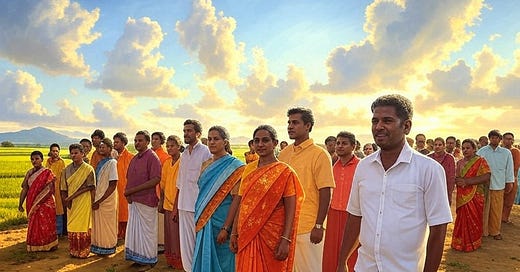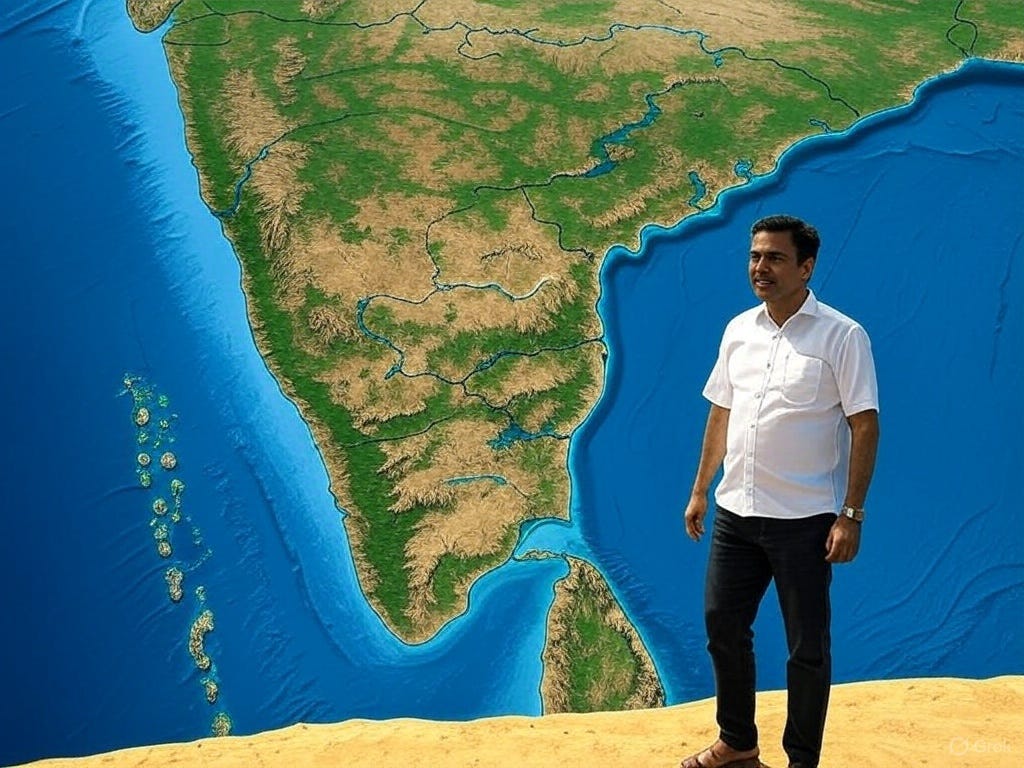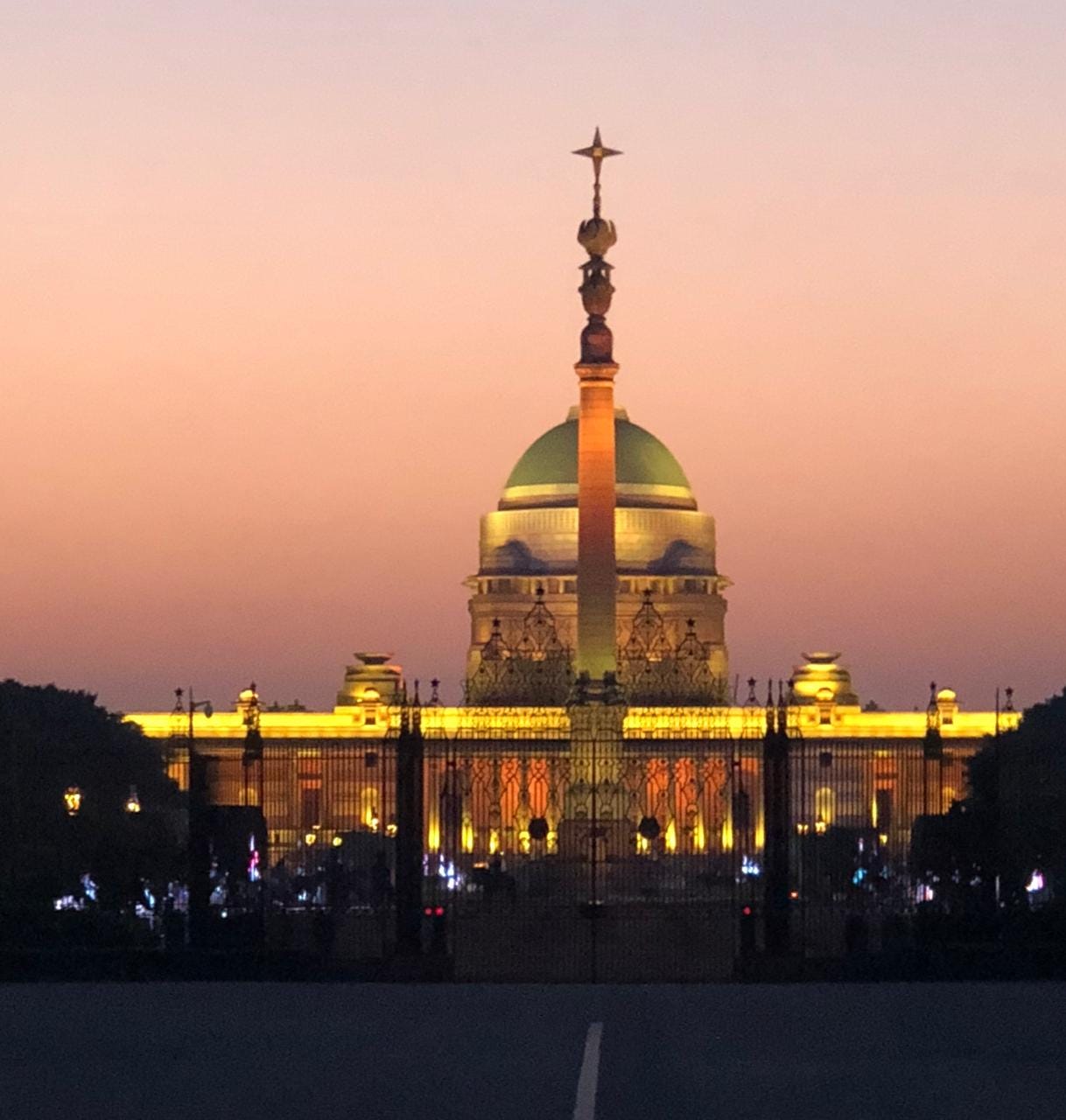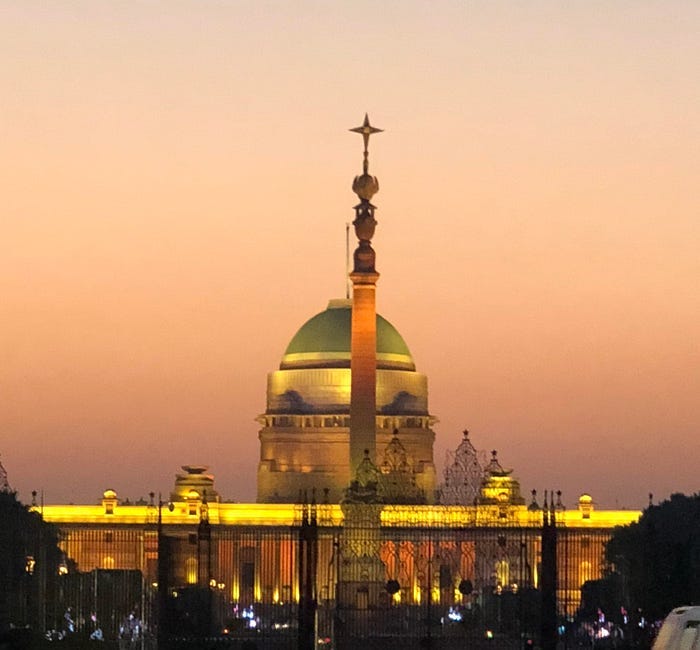Let’s Not Push Them Towards a Federation of ‘Dakshin’ Bharat
The Gathering Storm: Southern States Unite Against Perceived Northern Hindi Bias.
Southern States Unite Against Perceived Northern Bias
In an unprecedented development in India’s federal journey, the southern states of Tamil Nadu, Kerala, Karnataka, Andhra Pradesh, and Telangana find themselves aligned in their grievances—not directly against the Union of India, but against what they perceive as systemic and systematic inequities favouring Hindi-speaking northern states. This regional solidarity emerges as a response to policy decisions that southern leaders believe disproportionately benefit the “cow belt” states where the BJP’s “Hindi, Hindu, Hindutva” agenda has found fertile ground. While secession remains far from consideration, three critical issues threaten to deepen this north-south divide and potentially destabilise India’s federal harmony.
The Delimitation Dilemma: Population Versus Performance
1. Historical Context and Current Disparities
Delimitation in independent India has been implemented three times based on the censuses of 1951, 1961, and 1971, which gradually increased Lok Sabha seats from 494 to 543. However, the process was suspended in 1976 by the Indira Gandhi Government amid concerns about imbalanced representation between states with differing fertility rates. This 50-year freeze has created significant disparities in representation across states.
Today, a critical disparity exists: northern states with higher population growth rates would gain substantially more seats if delimitation proceeds purely based on population, while southern states that successfully implemented family planning policies would lose relative representation. For instance, a voter in Kerala currently represents nearly double the value compared to one in Uttar Pradesh due to these population disparities.
2. The Numbers Game
The stark mathematics of population-based delimitation reveals why southern states are alarmed. If the 1971 population-to-MP ratio were maintained today, the Lok Sabha would need to expand to approximately 1,875 members, with Uttar Pradesh alone receiving 318 seats. Even in more moderate scenarios, such as expanding to 848 members, northern states would gain disproportionately.
Tamil Nadu Chief Minister M.K. Stalin recently convened an all-party conference that adopted a resolution advocating postponement of delimitation by 30 years. This is not merely about numbers but about what southern leaders see as punishment for responsible governance—having successfully controlled population growth, these states now face reduced parliamentary representation.
3. Proposed Solutions
Several approaches have been suggested to address this dilemma. One proposal advocates treating the current distribution of Lok Sabha seats as a “federal contract” that should never be revisited. Others suggest expanding the Lok Sabha while ensuring no state loses seats, redistributing Rajya Sabha seats more equitably, or adopting a combined approach.
The argument from southern states is compelling: why should states that followed national family planning directives be penalised with reduced representation? Yet equally strong is the constitutional principle of “one person, one vote”, which becomes compromised when population disparities exist.
Fiscal Federalism: Funding Formulas Under Fire
1. Vertical and Horizontal Imbalances
India’s fiscal federalism faces two significant challenges: vertical fiscal imbalance between the Union and states, and horizontal imbalance among states themselves. The Union government holds greater powers to generate revenue while states bear most expenditure responsibilities. This creates a dependency wherein states must rely on central transfers to fulfil their constitutional obligations.
Despite the Fifteenth Finance Commission declaring a 41% share for states, the effective devolution was only 33.16% of the Union’s gross tax revenue. The increasing reliance on cesses and surcharges by the central government—which do not form part of the divisible pool—has further constrained state finances.
2. The Performance Paradox
Southern states contribute disproportionately to national revenue yet receive less in central allocations. This occurs because Finance Commission formulas typically compensate based on population, poverty levels, per capita income, and geographical area—criteria that often favour less developed states.
States like Tamil Nadu, Karnataka, and Kerala that have achieved better economic and development outcomes feel they are effectively subsidising poorly governed states in the Hindi heartland. As one Tamil Nadu official put it, “We work hard but bleed to subsidise non-performers.”
3. Intra-State Disparities and Regional Development
The 16th Finance Commission must also consider that disparities exist not just between states but within them. Within many states, capital cities like Bengaluru in Karnataka and Mumbai in Maharashtra receive disproportionate government expenditure while peripheral districts remain neglected. These intra-state disparities can have far-reaching consequences, sometimes manifesting as violence or unrest in neglected regions.
Progressive states also face unique challenges related to ageing populations and rapid urbanisation, which strain their fiscal capacities while necessitating increased infrastructure investment. These demographic transitions are not adequately factored into resource allocation formulas.
Language Politics: The Emotional Catalyst
1. The Three-Language Formula Controversy
The National Education Policy 2020’s three-language formula has reignited historical anxieties about Hindi imposition in southern states. While the Union Education Ministry has stated in Parliament that “no language to be imposed on any state under the three-language formula,” southern states remain sceptical.
Tamil Nadu, which has historically opposed the three-language formula, sees it as a step towards promoting Hindi at the expense of regional languages. Chief Minister Stalin has accused the central government of trying to impose Hindi and has refused to implement the three-language formula.
This controversy intensified when the central government withheld ₹2,152 crore meant for Tamil Nadu’s Samagra Shiksha scheme, citing the state’s refusal to implement the NEP. Such financial penalties for linguistic autonomy only deepen southern suspicions of a hidden agenda.
2. The Reddit Analysis
A popular Reddit post explains how Hindi imposition functions through seemingly neutral policies: “The Three language policy of the Union Government through the National Education Policy 2020 is an unjust attempt to impose Hindi on South Indians.” It illustrates that while technically students can choose any Indian language as their third language, practical implementation makes Hindi the default choice in most institutions.
The post gives an example of a class with students choosing nine different languages, creating a logistical impossibility for schools to provide teachers for each. In practice, this results in Hindi becoming the only viable option—effectively imposing it through administrative reality rather than direct mandate.
3. Provocative Rhetoric
Statements from BJP leaders and RSS functionaries advocating Hindi as a national unifier have further inflamed tensions. Southern leaders interpret such rhetoric as dismissive of their linguistic heritage and cultural identity. These language politics tap into deep historical grievances, particularly in Tamil Nadu, where anti-Hindi movements have shaped regional politics for generations.
Preserving the Union: The Need for Statesmanship
1. Lessons from History, Distant and Recent
India’s founding fathers, including Pandit Nehru and Sardar Patel, successfully integrated princely states through dialogue, compromise, and a deep respect for regional identities. A similar spirit of statesmanship is urgently required today. The basic structure doctrine established in the Kesavananda Bharati case provides constitutional protection against unilateral changes to India’s federal character. However, legal safeguards alone cannot substitute for genuine consensus-building.
Moreover, the current political composition of the two Houses of Parliament makes it difficult to enact constitutional amendments without broad-based support. Yet, the introduction of proposed legislations such as "One Nation, One Election" has fuelled apprehensions among several observers that the Modi 3.0 Government may seek to push transformative changes through ordinary central laws, rather than pursuing the rigorous path of constitutional amendment. This perception—that critical federal changes might bypass parliamentary consensus—has only deepened southern scepticism and reinforced calls for a more consultative and cooperative federal process.
2. The Coastal Consideration
The southern states, with their extensive coastlines and strategic maritime positions, hold significant geopolitical importance. Their economic contributions and human development achievements make them vital to India’s global aspirations. Any alienation of these states would have profound national consequences extending far beyond domestic politics.
3. Dialogue Over Dominance
The current situation demands national consultation rather than bulldozing legislation through parliamentary majority. The BJP and its allies still lack the numbers to unilaterally amend the Constitution, providing an opportunity for inclusive dialogue.
The grievances of southern states reflect legitimate concerns about representation, resource allocation, and cultural identity—cornerstones of India’s diverse democracy. Addressing these concerns through respectful engagement rather than dismissal is essential to preserving the Union of India.
The Path Forward: Federal Harmony Through Equitable Partnership
The solution to these mounting tensions lies not in centralising power but in reinvigorating cooperative federalism. India’s strength has always derived from its diversity, and its future depends on equitable partnership between states and the centre.
The north-south divide need not become a permanent fault line if addressed with wisdom and foresight. Through balanced approaches to delimitation, fair fiscal allocations, and respectful language policies, India can transform potential discord into productive diversity.
As southern states find common cause in their grievances, the response from the centre will determine whether this moment becomes a crisis of unity or an opportunity for strengthening India’s federal compact. The choice between imposition and inclusion will shape the Indian Republic’s future for generations to come.








Population based decision making power makes no sense. Those working hard all their lives, and those doing nothing cannot have equal rights/powers to elect a govt. In families, one who earns has most decision making. There must be some eligibility criteria, apart from just age, for voting. Regional parties in Non-hindi speaking states, South, Bengal and Punjab face threat from BJP, due to their extreme corruption and BJP's track record of governance. UP is a classical case, where BJP handed over the power to a local, on merit basis, and moved SP/BSP out of competition. The day BJP gets Yogi equivalents in these states, local parties will become irrelevant. However, I agree that national level power should not tilt in favor of some states just because they have higher population.
It is possibly time to initiate a debate if everyone should have equal voting powers, irrespective of their contributions.